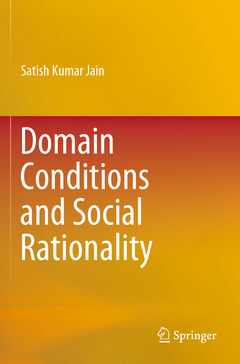Domain Conditions and Social Rationality, 1st ed. 2019
Auteur : Jain Satish Kumar

This book primarily focuses on the domain conditions under which a number of important classes of binary social decision rules give rise to rational social preferences. One implication of the Arrow and Gibbard theorems is that every non-oligarchic social decision rule that satisfies the condition of independence of irrelevant alternatives, a requirement crucial for the unambiguity of social choices, and the weak Pareto criterion fails to generate quasi-transitive social preferences for some configurations of individual preferences. The problem is exemplified by the famous voting paradox associated with the majority rule. Thus, in the context of rules that do not give rise to transitive (quasi-transitive) social preferences for every configuration of individual preferences, an important problem is that of formulating Inada-type necessary and sufficient conditions for transitivity (quasi-transitivity).
This book formulates conditions for transitivity and quasi-transitivity for several classes of social decision rules, including majority rules, non-minority rules, Pareto-inclusive non-minority rules, and social decision rules that are simple games. It also analyzes in detail the conditions for transitivity and quasi-transitivity under the method of the majority decision, and derives the maximally sufficient conditions for transitivity under the class of neutral and monotonic binary social decision rules and one of its subclasses. The book also presents characterizations of some of the classes of rules for which domain conditions have been derived.
The material covered is relevant to anyone interested in studying the structure of voting rules, particularly those interested in social choice theory. Providing the necessary social choice theoretic concepts, definitions, propositions and theorems, the book is essentially self-contained. The treatment throughout is rigorous, and unlike most of the literature on domain conditions, care is taken regarding the number of individuals in the 'necessity' proofs. As such it is an invaluable resource for students of economics and political science, with takeaways for everyone ? from first-year postgraduates to more advanced doctoral students and scholars.
Satish K. Jain is an economist who holds a Master’s in Economics from Delhi School of Economics and a Doctorate in Economics from the University of Rochester. He was on the faculty of the Centre for Economic Studies and Planning at Jawaharlal Nehru University for three and a half decades. He was Reserve Bank of India Chair Professor from 2011 to 2013, and was an Indian Council of Social Science Research (ICSSR) National Fellow from 2016 to 2018. He has taught at Shri Ram College of Commerce, Delhi; the Indian Statistical Institute, Delhi; and the Indian Institute of Information Technology, Hyderabad. He has authored Economic Analysis of Liability Rules (Springer, 2015); edited Law and Economics (Oxford University Press, 2010); and co-edited Economic Growth, Efficiency, and Inequality (with Anjan Mukherji, Routledge, 2015). His teaching and research interests include social choice theory, and law and economics.
Date de parution : 11-2020
Ouvrage de 193 p.
15.5x23.5 cm
Date de parution : 11-2019
Ouvrage de 193 p.
15.5x23.5 cm



